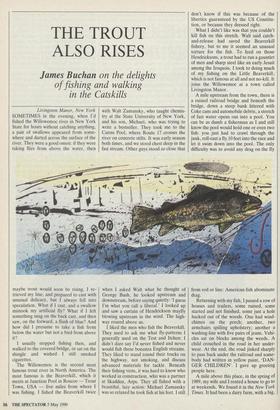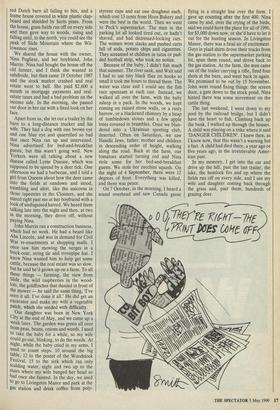THE TROUT ALSO RISES
of fishing and walking in the Catskills
Livingston Manor, New York SOMETIMES in the evening, when I'd fished the Willowemoc river in New York State for hours without catching anything, a pair of swallows appeared from some- where and darted across the surface of the river. They were a good omen: if they were taking flies from above the water, then maybe trout would soon be rising. I re- trieved my line, and prepared to cast with unusual delicacy, but I always fell into speculation. What if I cast, and a swallow mistook my artificial fly? What if I felt something snag on the back cast, and then saw, on the forward, a flash of blue? And how did I presume to take a fish from below the water but not a bird from above it?
I usually stopped fishing then, and walked to the covered bridge, or sat on the shingle and wished I still smoked cigarettes.
The Willowemoc is the second most famous trout river in North America. The most famous is the Beaverkill, which it meets at Junction Pool in Roscoe — Trout Town, USA — five miles from where I was fishing. I fished the Beaverkill twice with Walt Zamansky, who taught chemis- try at the State University of New York, and his son, Michael, who was trying to write a bestseller. They took me to the Cairns Pool, where Route 17 crosses the river on concrete stilts. It was early season both times, and we stood chest deep in the fast stream. Other guys stood so close that when I asked Walt what he thought of George Bush, he looked upstream and downstream, before saying quietly: 'I guess I'm what you call a liberal.' I looked up and saw a curtain of Hendrickson mayfly blowing upstream in the wind. The high- way roared above us.
I liked the men who fish the Beaverkill. They used to ask me what fly-patterns I generally used on the Test and Itchen: I didn't dare say I'd never fished and never would fish these bonanza English streams. They liked to stand round their trucks on the highway, not smoking, and discuss advanced materials for tackle. Beneath their fishing vests, it was hard to know who worked in construction, who was a partner at Skadden, Arps. They all fished with a beautiful, lazy action: Michael Zamansky was so relaxed he took fish at his feet. I still don't know if this was because of the liberties guaranteed by the US Constitu- tion, or because they dressed right.
What I didn't like was that you couldn't kill fish on this stretch. Walt said catch- and-release had saved the Beaverkill fishery, but to me it seemed an unusual torture for the fish. To feed on those Hendricksons, a trout had to run a gauntlet of men and sharp steel like an early Jesuit among the Iroquois. I took to doing much of my fishing on the Little Beaverkill, which is not famous at all and not no-kill. It joins the Willowemoc at a town called Livingston Manor.
A mile upstream from the town, there is a ruined railroad bridge and beneath the bridge, down a steep bank littered with Coke cans and automobile debris, a stretch of fast water opens out into a pool. You can be as dumb a fisherman as I and still know the pool would hold one or even two fish: you just had to crawl through the junk, roll-cast a fly 10 feet into the race and let it swim down into the pool. The only difficulty was to avoid any drag on the fly from rod or line: American fish abominate drag.
Returning with my fish, I passed a row of houses and trailers, some ruined, some started and not finished, some just a hole hacked out of the woods. One had wind- chimes on the porch; another, two armchairs spilling upholstery; another a washing-line with five pairs of jeans. Vehi- cles sat on blocks among the weeds. A child crouched in the road in her under- wear. At the end, the road jinked sharply to pass back under the railroad and some- body had written in yellow paint, 'DAN- GER CHILDREN'. I gave up greeting people here.
A mile above this place, in the spring of 1989, my wife and I rented a house to go to at weekends. We found it in the New York Times. It had been a dairy farm, with a big, red Dutch barn all falling to bits, and a frame house covered in white plastic clap- board and shielded by Scots pines. From the house, grass fields ran off on every side and then gave way to woods, rising and falling until, to the north, you could see the peak of Slide Mountain where the Wil- lowemoc rises.
We shared the house with the owner, Nina Pugliese, and her boyfriend, John Marrin. Nina had bought the house off the old farmer, and I think she wanted to subdivide, but then came 19 October 1987 and the stock market crashed and real estate went to hell. She paid $2,600 a month in mortgage payments and real- estate taxes and had a bad problem on the income side. In the morning, she passed our door in her car with a fixed look on her face.
Apart from us, she let out a trailer by the barn to a long-distance trucker and his wife. They had a dog with one brown eye and one blue eye and quarrelled so bad that once Nina ran up and intervened. Nina advertised for bed-and-breakfast guests, but this wasn't going well. New Yorkers were all talking about a new disease called Lyme Disease, which was supposed to be spread by a deer tick. One afternoon we had a barbecue, and I told a girl from Queens about how the deer came into the fields at sundown and stood, trembling and alert, like the unicorns in those tapestries in the Cloisters, and she stared right past me at her boyfriend with a look of undisguised hatred. We heard them talking late into the night and then, at two in the morning, they drove off, without paying Nina.
John Marrin ran a construction business, which had no work. He had a beard like Abe Lincoln, and was in demand for Civil War re-enactments at shopping malls. I once saw him mowing the verges in a frock-coat, string tie and stovepipe hat. I know Nina wanted him to help get some cattle, because the real estate was so slow, but he said he'd grown up on a farm. To all these things — farming, the view from Slide, the wild raspberries in the wood- lots, the goldfinches that danced in front of the mower — he said the same thing, 'I've seen it all. I've done it all.' He did get an excavator and make my wife a vegetable patch, which she seeded with difficulty.
Our daughter was born in New York City at the end of May, and we came up a week later. The garden was green all over from peas, beans, onions and weeds. I used to take the baby for a while, so my wife Could go out, blinking, to do the weeds. At night, while the baby cried in my arms, I used to count steps: 10 around the big table, 12 to the poster of the Woodstock Festival, 15 to the sink which ran only scalding water, eight and two up to the stairs where my wife banged her head so bad once she fainted. In the day, we used to go to Livingston Manor and park at the gas station and drink coffee from poly- styrene cups and eat one doughnut each, which cost 13 cents from Hoos Bakery and were the best in the world. Then we went to Peck's supermarket. The men in the parking lot all looked tired out, or hadn't shaved, and had distressed-looking cars. The women wore slacks and pushed carts full of soda, potato chips and cigarettes. They screamed at children in tutus or pad- ded football strip, who took no notice.
Because of the baby, I didn't fish much that summer. The river sank, and Walt said I had to use tiny black flies on hooks so small it took me hours to thread them. The water was clear and I could see the fish race upstream at each cast. Instead, we walked all over the farm, with the baby asleep in a pack. In the woods, we kept coming on ruined stone walls, or a rusty harrow, or a blackened chimney by a heap of tumbledown stones and a few apple trees covered in brambles. Once we blun- dered into a Ukrainian sporting club, deserted. Often on Saturdays, we saw Hasidic Jews, father, mother and children in descending order of height, walking along the road. Back at the farm, our tomatoes started turning red and Nina stole some for her bed-and-breakfast guests. We stole her zucchini squash. On the night of 4 September, there were 12 degrees of frost. Everything was killed, and there was peace.
On 7 October, in the morning, I heard a sound overhead and saw Canada geese flying in a straight line over the farm. I gave up counting after the first 400. Nina came by and, over the crying of the birds, said we could have the place for all of 1990, for $3,000 down now, or she'd have to let it out for the hunting season. In Livingston Manor, there was a fatal air of excitement. Guys in plaid shirts drove their trucks from the gas station to the supermarket parking lot, spun them round, and drove back to the gas station. At the farm, the man came out of the trailer carrying a rifle, fired four shots at the barn, and went back in again. We promised to be out by 15 November. John went round fixing things: the screen door, a gate down to the stock pond. Nina hinted there was some movement on the cattle thing.
The last weekend, I went down to my pool by the railroad bridge, but I didn't have the heart to fish. Climbing back up the bank, I walked up through the houses. A child was playing on a trike where it said `DANGER CHILDREN'. I knew then, as I know now, that this wasn't a warning but a fact. A child had died there, a year ago or five years ago, in the irretrievable Amer- ican past.
In my memory, I get into the car and drive up the hill, past the last trailer, the lake, the hemlock firs and up where the fields run off on every side, and I see my wife and daughter coming back through the grass and, past them, hundreds of grazing deer.



















































 Previous page
Previous page